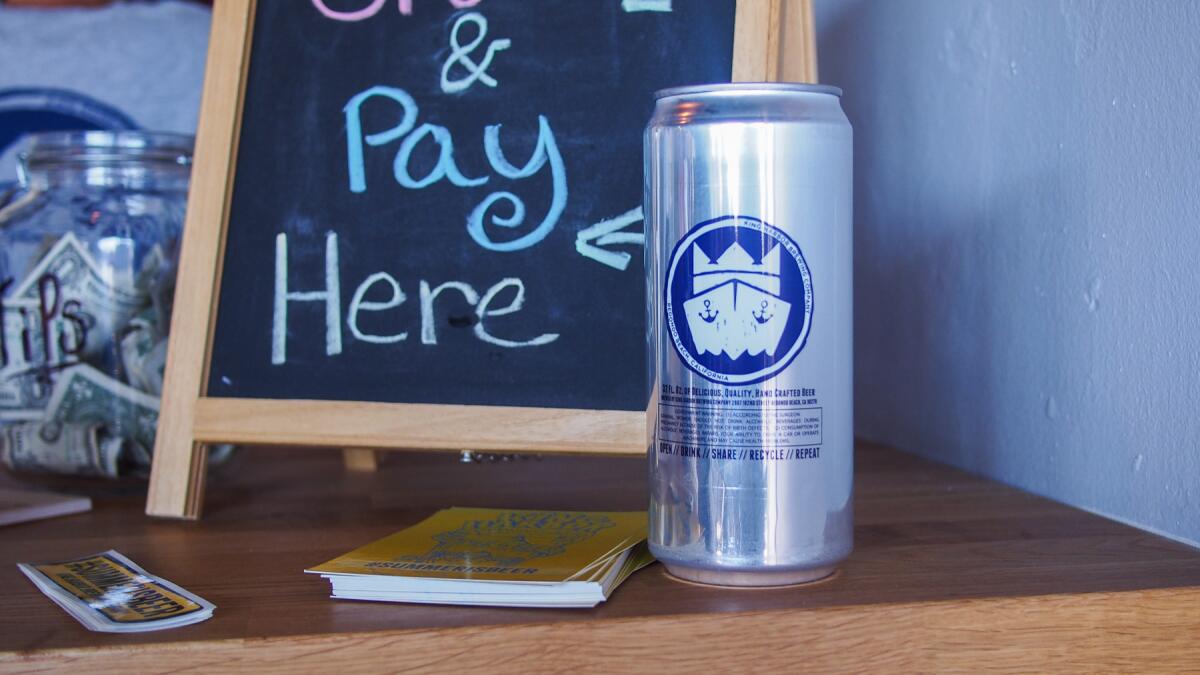Crowlers vs. growlers: How to take your favorite craft brews home

A crowler (32-ounce can) from King Harbor.
- Share via
Canned craft beer is bigger than ever before, and now, crowlers, the fill-to-order cans, are replacing growlers, the reusable brown glass jugs, as the preferred way for local breweries to package beer to take home.
Growlers are a popular way to take your favorite craft brews with you, but they’re not without their downsides. Apart from having to remember to bring your empty growlers with you on a brewery crawl, you’ve got to keep them spotlessly clean to avoid befouling the next fill-up; they can be difficult to transport and especially to pour; and unless you’re sharing with friends, the two-liter capacity of most growlers can mean a race to finish the beer before it goes flat or stale.
Enter the crowler — a 32-ounce aluminum can that can be filled at a standard draft tap just like a growler, before a pop-top lid is crimped on to seal the can.
Despite the somewhat awkward name, the crowler concept has taken off in the craft beer world with a half-dozen L.A.-area tasting rooms now offering the aluminum alternatives for to-go suds. Colorado brewery Oskar Blues — which arguably started the canned craft beer revolution — developed the on-demand canning stations based on a household machine that was designed for home canners. The brewery tested the process at its Longmont, Colo., tasting room, and the response was so enthusiastic that it began selling the countertop can seamers and empty crowlers to other craft breweries.
King Harbor Brewing in Redondo Beach was one early adopter of the crowler concept when it opened its Waterfront Tasting Room last summer. “I love ’em,” said Phil McDaniels, head brewer at King Harbor. “They’re doing great [at the harbor tasting room], and another crowler machine is on our wish list for the brewery tasting room.”
The one-and-done nature of the aluminum vessels makes them an attractive option for customers who don’t want to purchase a branded glass jug from a brewery they might not visit regularly. Empty growlers can cost from $6 to more than $10, plus the price of the fill. The disposable crowlers are often just a dollar or two on top of the cost of the beer.
“We get a different crowd at the waterfront,” McDaniels said. “It’s less hardcore beer geeks and more tourists. We’re going through a ton of crowlers.”
Crowlers are also popular at Mumford Brewing in downtown. “They out-sell growlers 5 to 1,” said founder Peter Mumford. “Maybe 10 to 1. Most of our customers are not locals, and the non-committal aspect and lower price of the crowler make them really attractive.”
A crowler of Mumford’s beer, the equivalent of two pints, costs $9 to $12, while an empty glass growler is $10, plus the cost of the fill (typically about $16 for 2 liters — about 4 pints).
Besides cost, crowlers are lighter and more durable than glass bottles, and while they are good for only a single use, they are fully recyclable. The biggest downside to crowlers from the brewer’s point of view has been concern about the flavor stability of the package, but McDaniels says he’s been pleasantly surprised by how well beer holds up in the big cans.
“As long as they are filled properly and treated right, crowlers should be stable for a couple of weeks,” he said. That’s far longer than the typical lifespan of a growler, which brewers usually set at three to five days. Proper filling techniques at the taprooms are important to minimize the beer’s exposure to oxygen (which can dull hoppy flavors and stale the brew). Ideally, the empty cans are purged with CO2 and filled from the bottom up with a tube attached to the draft faucet. Once in the consumer’s hands, the brewer says they should be “treated like milk” and kept cold whenever possible.
Crowlers are available at the following L.A.-area brewery tasting rooms: Golden Road Brewing Pub; Iron Triangle Brewing Company, King Harbor Waterfront Tasting Room, Pocock Brewing Co., Sanctum Brewing Company, Stone Brewing Company Store and Transplants Brewing Company.
ALSO:
How to make the perfect strawberry mojito
Where to get great vegan fro-yo and ice cream
Want your dumplings and bao in different colors? Head to Rowland Heights
More to Read
Eat your way across L.A.
Get our weekly Tasting Notes newsletter for reviews, news and more.
You may occasionally receive promotional content from the Los Angeles Times.







